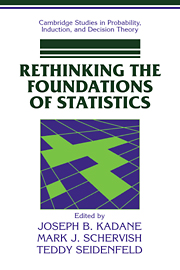Book contents
- Frontmatter
- Contents
- Introduction
- PART 1 DECISION THEORY FOR COOPERATIVE DECISION MAKING
- PART 2 THE TRUTH ABOUT CONSEQUENCES
- PART 3 NON-COOPERATIVE DECISION MAKING, INFERENCE, AND LEARNING WITH SHARED EVIDENCE
- 3.1 Subjective Probability and the Theory of Games
- 3.2 Equilibrium, Common Knowledge, and Optimal Sequential Decisions
- 3.3 A Fair Minimax Theorem for Two-Person (Zero-Sum) Games Involving Finitely Additive Strategies
- 3.4 Randomization in a Bayesian Perspective
- 3.5 Characterization of Externally Bayesian Pooling Operators
- 3.6 An Approach to Consensus and Certainty with Increasing Evidence
- 3.7 Reasoning to a Foregone Conclusion
- 3.8 When Several Bayesians Agree That There Will Be No Reasoning to a Foregone Conclusion
- Index of Names
- Subject Index
3.5 - Characterization of Externally Bayesian Pooling Operators
Published online by Cambridge University Press: 05 June 2012
- Frontmatter
- Contents
- Introduction
- PART 1 DECISION THEORY FOR COOPERATIVE DECISION MAKING
- PART 2 THE TRUTH ABOUT CONSEQUENCES
- PART 3 NON-COOPERATIVE DECISION MAKING, INFERENCE, AND LEARNING WITH SHARED EVIDENCE
- 3.1 Subjective Probability and the Theory of Games
- 3.2 Equilibrium, Common Knowledge, and Optimal Sequential Decisions
- 3.3 A Fair Minimax Theorem for Two-Person (Zero-Sum) Games Involving Finitely Additive Strategies
- 3.4 Randomization in a Bayesian Perspective
- 3.5 Characterization of Externally Bayesian Pooling Operators
- 3.6 An Approach to Consensus and Certainty with Increasing Evidence
- 3.7 Reasoning to a Foregone Conclusion
- 3.8 When Several Bayesians Agree That There Will Be No Reasoning to a Foregone Conclusion
- Index of Names
- Subject Index
Summary
ABSTRACT
When a panel of experts is asked to provide some advice in the form of a group probability distribution, the question arises as to whether they should synthesize their opinions before or after they learn the outcome of an experiment. If the group posterior distribution is the same whatever the order in which the pooling and the updating are done, the pooling mechanism is said to be externally Bayesian by Madansky (1964). In this chapter, we characterize all externally Bayesian pooling formulas and we give conditions under which the opinion of the group will be proportional to the geometric average of the individual densities.
INTRODUCTION
Let (Θ,µ) be a measure space and let Δ be the class of µ-measurable functions f:Θ→ (0,∞) such that f > 0 µ-a.e. and ∫fdµ = 1. In the language of multiagent statistical decision theory (cf. Weerahandi and Zidek, 1981), a pooling operator is any function T: AnΔ → Δ which may be used to extract a “consensus” T (f1,…,fn) from the different subjective opinions f1,…,fn ∈ Δ of the n members of a group. The current interest for pooling operators seems to stem from a theorem due to Wald (1939) concerning the optimality of Bayesian decision rules.
- Type
- Chapter
- Information
- Rethinking the Foundations of Statistics , pp. 314 - 332Publisher: Cambridge University PressPrint publication year: 1999
- 1
- Cited by



